2015年新课标高考英语听力真题与听力原文
2015年全国统一高考英语试卷听力+原文+答案(新课标Ⅰ、Ⅱ)
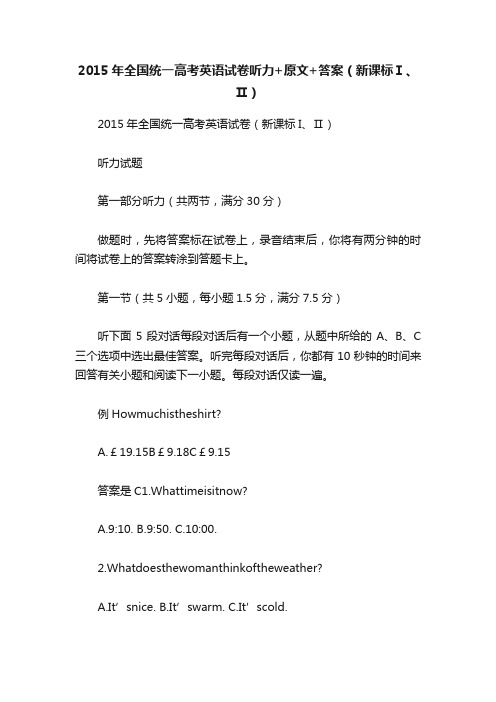
2015年全国统一高考英语试卷听力+原文+答案(新课标Ⅰ、Ⅱ)2015年全国统一高考英语试卷(新课标I、Ⅱ)听力试题第一部分听力(共两节,满分30分)做题时,先将答案标在试卷上,录音结束后,你将有两分钟的时间将试卷上的答案转涂到答题卡上。
第一节(共5小题,每小题1.5分,满分7.5分)听下面5段对话每段对话后有一个小题,从题中所给的A、B、C 三个选项中选出最佳答案。
听完每段对话后,你都有10秒钟的时间来回答有关小题和阅读下一小题。
每段对话仅读一遍。
例Howmuchistheshirt?A.£19.15B£9.18C£9.15答案是C1.Whattimeisitnow?A.9:10.B.9:50.C.10:00.2.Whatdoesthewomanthinkoftheweather?A.It’snice.B.It’swarm.C.It’scold.3.Whatwillthemando?A.Attendameeting.B.Givealecture.C.Leavehisoffice.4.Whatisthewoman’sopinionaboutthecourse?A.Toohard.B.Worthtaking.C.Veryeasy.5.Whatdoesthewomanwantthemantodo?A.Speaklouder.B.Apologizetoher.C.Turnofftheradio.第二节(共15小题;每小题1.5分,满分22.5分)听下面5段对话或独白。
每段对话或独白后有几个小题,从题中所给的A、B、C三个选项中选出最佳选项,并标在试卷的相应位置。
听每段对话或独白前,你将有时间阅读各个小题,每小题5秒钟;听完后,各小题将给出5秒钟的作答时间。
每段对话或独白读两遍。
听第6段材料,回答第6、7题。
6.HowlongdidMichaelstayinChina?A.Fivedays.B.Oneweek.C.Twoweeks.7.WheredidMichaelgolastyear?A.Russia.B.Norway.C.India.听第7段材料,回答第8、9题。
2015年高考全国Ⅰ卷英语试题(含听力音频、听力原文和答案)
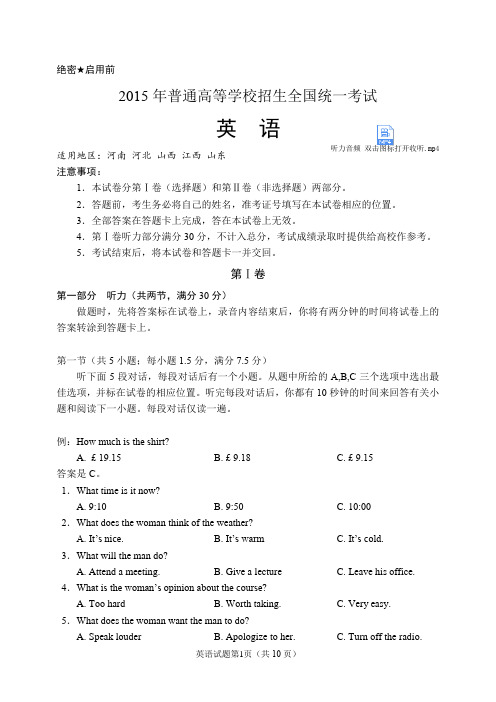
绝密★启用前2015年普通高等学校招生全国统一考试英语听力音频 双击图标打开收听.mp4适用地区:河南河北山西江西山东注意事项:1.本试卷分第Ⅰ卷(选择题)和第Ⅱ卷(非选择题)两部分。
2.答题前,考生务必将自己的姓名,准考证号填写在本试卷相应的位置。
3.全部答案在答题卡上完成,答在本试卷上无效。
4.第Ⅰ卷听力部分满分30分,不计入总分,考试成绩录取时提供给高校作参考。
5.考试结束后,将本试卷和答题卡一并交回。
第Ⅰ卷第一部分听力(共两节,满分30分)做题时,先将答案标在试卷上,录音内容结束后,你将有两分钟的时间将试卷上的答案转涂到答题卡上。
第一节(共5小题;每小题1.5分,满分7.5分)听下面5段对话,每段对话后有一个小题。
从题中所给的A,B,C三个选项中选出最佳选项,并标在试卷的相应位置。
听完每段对话后,你都有10秒钟的时间来回答有关小题和阅读下一小题。
每段对话仅读一遍。
例:How much is the shirt?A.£ 19.15B. £ 9.18C. £ 9.15答案是C。
1.What time is it now?A. 9:10B. 9:50C. 10:002.What does the woman think of the weather?A. It’s nice.B. It’s warmC. It’s cold.3.What will the man do?A. Attend a meeting.B. Give a lectureC. Leave his office. 4.What is the woman’s opinion about the course?A. Too hardB. Worth taking.C. Very easy. 5.What does the woman want the man to do?A. Speak louderB. Apologize to her.C. Turn off the radio.第二节(共15小题;每小题1.5分,满分22.5分)听下面5短话或独白,每段话或独白后有几个小题,从题中所给的A、B、C三个选项中选出最佳选项,并标在试卷的相应位置。
2015年高考全国卷英语听力试题与文稿

2015年高考全国卷英语听力试题、链接、原文及听力试题分析(新课标听力适用课标1卷、课标2卷、江苏卷、安徽卷、福建卷) 第一节(共5小题;每小题1.5分,满分7.5分)1.What time is it now?A. 9:10B. 9:50C. 10:002.What does the woman think of the weather?A. It’s niceB. It’s warmC. It’s cold3.What will the man do?A. Attend a meetingB. Give a lectureC. Leave his office4.What is the woman’s opinion about the course?A. Too hardB. Worth takingC. Very easy5. What does the woman want the man to do ?A. Speak louder.B. Apologize to her.C. Turn off the radio.第二节(共15小题;每小题1.5分,满分22.5分)6. How long did Michael stay in China?A. Five days.B. One week.C.Two weeks.7. Where did Michael go last year?A. Russia.B. Norway.C. India.听第7段材料,回答第8、9题8.What food does Sally like?A.Cook dinner.B.Fish.C.Eggs.9.What are the speakers going to do?A.Cook dinner.B.Go shopping.C.Order dishes.听第8段材料,回答第10至12题.10.Where are the speakers?A.In a hospital.B.In the office.C.At home.11.When is the report due ?A.Thursday.B.Friday.C.Next Monday.12.What does George suggest Stephanie do with the report?A.Improve it.B.Hand it in later.C.Leave it with him.听第9段材料,回答第13至16题。
2015年高考全国新课标I卷英语听力原文(共5篇)

2015年高考全国新课标I卷英语听力原文(共5篇)第一篇:2015年高考全国新课标I卷英语听力原文2015年高考英语新课标I卷听力原文第一节Dialog 1: W: What time is your train leaving? M: It leaves at 10.I’ve got 50 minutes left.W: You’d better hurry, or you won’t be able to catch it.Dialog 2: M: Nice weather we’re having!Don’t you think? W: No, it is too cold.M: I think it is just right.W: I’d prefer a few degrees warmer.Dialog 3 M: Now, let’s stop talking and get going.I need to be in my office in 15 minutes.Or I’ll be late for a meeting.W: OK.Bye!Dialog 4 M: This course is really difficult.W: I don’t think it’s all that bad.And we’ll benefit a lot from it.M:So you’re taking it, too.W: That’s true.Dialog 5 W: Could you turn that off?I can’t he ar myself think!M: What? W: The radio.M: Oh, sorry.第二节Dialog 6 W: Hi, Michael!I heard you just came back from a holiday? M: Yes.I stayed for a week in China and 5 days in India.W: You do travel a lot, don’t you? Last year, you went to Norway, right? M: We ll, I’ve been to quite some countries, but not yet to st summer, I toured Russia for two weeks.Dialog 7 M: Sally, do you like seafood? W: Yes, of course.M: Is there anything you especially like? W:Well, I really don’t know.I can never remember the name.M: Ok.Is there any food you don’t eat? W: Well, I don’t eat chicken, and I don’t like eggs, either.But I like all kinds of fish and vegetable.M: Then, let’s look at the menu , and see what they’ve got for us.Dialog 8 M: You look pale, Stephanie!What’s wrong? W: I don’t feel good.I have a bad headache.In fact, I haven’t got much sleep this past week, and Ifeel really tired.M: Why don’t you go to see a doctor? W: Yeah, I think I should.But I have a report due tomorrow.Ms.Jenkins means it for the board meeting next Monday.M: Well, it’s Wednesday today.Why don’t you talk to Ms.Jenkins and ask if you can hand it in on Friday morning? W: Maybe I should try.I guess I just need a good sleep.Thanks, Gorge.M: If you need any help for the report, just let me know.Dialog 9 W: Anything interesting in the paper today, dear? M: Well, yeah.There are a few here that might interest us.Here is one for just four hundred dollars.It only has one bedroom, but it sounds nice, near Lake Street.W: Yeah, let me see what the cheapest two-bedroom apartment is.Oh, here is one onMarket Street.It’s a real bargain.Only 350 dollars.But it doesn’t have any furniture.M: Well, it costs a lot to buy all the furniture.W: Oh, here is another one for just over four hundred dollars.This sounds very interesting.It’s on South Street.That’s a nice area!M: Yes, it’s quiet.Did you say two bedrooms? W: Yes, at 415 dollars.M: Why don’t we go and have a look? W: OK, I’ll give them a call.Monolog 10 Look at this picture.It’s the London Tea Trade centre.As you can see, it is on the North Bank of the River Thames.It is the center of an important industry in the everyday life of the British people.Tea is the British national drink.Every man, woman and child over ten years of age, has on average over four cups a day, or some one thousand five hundred cups annually.About 30 percent of the world’s export of tea makes its way to London.And Britain is by far the largest importer of tea in the world.Now in the second picture, you can see how tea is tasted in the Tea Trade Centre before it is sold.Here, different types of tea are tasted by skilled tea-tasters before they are sold at each week’s tea sale.It’s amazing to see them atwork!Over a hundred kinds of tea are laid out in a line on a long table.The tasters generally taste tea with milk, since that is how the majority of British people drink their tea.The tasters move down the line with surprising speed, tasting from a spoon and deciding what is a fair price for each tea.After that, they第二篇:2014高考全国II卷英语听力原文Listening Tape Script1.W: Excuse me.This is the address.How do I find it?M: Right.You need a street map.Here’s one, and I will show you where it is.2.W: Oh, my~ My car broke down, and I have to meet my aunt at the railway station before noon.M: You are lucky.I can drop you off on my way.3.W: Did you hear that Mr.Peterson is coming next week, Gorden?M: Yes.So I called all the department heads to my office this morning.We need to give him a reporton our program.4.W: I hope you like the book I lent you.I w asn’t sure if you’d be interested.M: I have the same doubt at first.But once I started, I simply couldn’t put it down.5.W: What is going on? It’s May, and we still have to wear warm clothes.M: Well, there is some good news on the radio.You probably can wea r shorts tomorrow.6.W: Harry, let’s play some pingpong today.M: I’d love to play a set or two, but right arm hurts.I’ve decided to stop playing pingpong until it feels better.W: Well, how about going skating.M: I’d like to, but my knees hurt, too.W: Harry, stop making excuses.You are just lazy.M: No, I am not.You know there is a basketball match on TV today.Let’s just stay home and watch it.W: OK.You stay, and I’ll play with Helen.7.W: What do you want to do tonight?M: How about going to the cinema? I should be home from work at 5:45.Then we can go out and eat before we see a film.W:What do you want to see?M: There is a good art film at the Greenhouse Cinema.W: Let’s see.It starts at 6:15.I don’t think we can get there in time to see the beginning.How about the action film at the Newstate Cinema? It starts at 6:50.Perhaps, the 7:00 o’clock one at the UME Cinema is even better.It stars Jackie Chan.M: OK.That’s fine.I like him, too.8.M: Hey, Lucy.Do you have some time to talk about next week’s trip with me? W: Sure.Dave.M: OK.So we are leaving on Monday from Hearts Field International Airport and returning on Friday.Do we take ourselves to the airport? Maybe we need to book a taxi.Or just go by bus.W: No.we don’t have to.The company car will pick us up and take us there.M: Oh, that’s good.When?W: Our flight leaves at 11 a.m., so they should pick us up between 8 and 9 a.m.Besides, the company will pay for our trip, including hotel and food.M: How much will that be?W: Well, New York is a pretty expensive city, so each of us will get $200 a day.M: Oh, OK.Thanks for telling me that.W: You are welcome.9.W: Please sit down.Let’s see: you are Mr.Smith.Is that correct? M: Yes.John Smith.第1页W: And you are interested in this job?M: Yes, I am.I’ll graduate from college the coming June.My major is Chinese.W: I see.Have you ever done any work in this field? M: Yes.I used to be a tour guide for Chinese travelers.W: Good.Now, how much money do you expect to have for a year?M: From what I’ve read, it seems that its starting pay would be around $12,000 a year?W: Here, you would start at $10,500 for the first year, a kind of training period.Then you would go to $15,000.M: That sounds fair enough.What do you think are the chances for me to get ajob here?W: Well, I’m talking to three people today, and four tomorrow.We’ll be hiring two people.You’ll hear from us some time next month.Good luck!And thanks for coming in today!10.Well, I’d love to share with you my personal opinion on city life and life in small towns.I grew up in a small town until I was 18, and then moved to a big city, so I have an experience of good and bad sides of both.I never thought that I would like to live in a big city, but I was wrong.After ten years of living in one, I can’t imagine ever living in small town again.Surely, small towns and big cities both have some problems in terms of transport.In a small town, you have to own a car to life comfortable.You can’t get around without one, because there isn’t any kind of public transport.Big cities generally have heavy traffic and expensive parking, but there you have a choice of taking public transport, which is cheaper than driving.So if you don’t have a car, you’d better live in the city.I also love the exciting life in big cities.I can always enjoy a lot of films, concerts and other wonderful shows.However, these things are not common in small towns.The final thing I like about large cities is that you can meet different kinds of people.However, you seldom find such variety of people in a smaller town.I think that living in an area where every one was just like me would quickly become dull.Of course, safety should be considered.And that’s one area where small towns are better than big cities.Still, I would rather be a bit more careful and live in a large city than feel safe but dull.共4页第三篇:2012年高考英语听力试题(全国新课标卷)2012年高考英语听力试题(全国新课标卷)第一部分听力(共两节,满分30分)做题时,先将答案标在试卷上。
2015年贵州省高考英语试卷听力+原文+答案(新课标Ⅰ、II)

2015年贵州省高考英语试卷听力+原文+答案(新课标Ⅰ、II)2015年贵州省高考英语试卷(新课标I、Ⅱ)听力试题第一部分听力(共两节,满分30分)做题时,先将答案标在试卷上,录音结束后,你将有两分钟的时间将试卷上的答案转涂到答题卡上。
第一节(共5小题,每小题1.5分,满分7.5分)听下面5段对话。
每段对话后有一个小题,从题中所给的A、B、C三个选项中选出最佳答案。
听完每段对话后,你都有10秒钟的时间来回答有关小题和阅读下一小题。
每段对话仅读一遍。
例: How much is the shirt?A. £ 19.15B. £9.18C. £9.15答案是C.1. What time is it now?A. 9:10.B. 9:50.C. 10:00.2. What does the woman think of the weather?1A. It’s nice.B. It’s warm.C. It’s cold.3. What will the man do?A. Attend a meeting.B. Give a lecture.C. Leave his office.4. What is the woman’s opinion about the course?A. Too hard.B. Worth taking.C. Very easy.5. What does the woman want the man to do?A. Speak louder.B. Apologize to her.C. Turn off the radio.第二节(共15小题;每小题1.5分,满分22.5分)听下面5段对话或独白。
每段对话或独白后有几个小题,从题中所给的A、B、C三个选项中选出最佳选项,并标在试卷的相应位置。
听每段对话或独白前,你将有时间阅读各个小题,每小题5秒钟;听完后,各小题将给出5秒钟的作答时间。
2015年全国高考听力及原文(全国卷1卷)

2015普通高等学校招生全国统一考试英语听力第一部分听力(共两节,满分30 分)做题时,现将答案标在试卷上,录音内容结束后,你将有两分钟的时间将试卷上的答案转涂到答题卡上。
第一节(共5小题;每小题1.5分,满分7.5分)听下面5段对话。
每段对话后有一个小题,从试题所给的A、B、C三个选项中选出最佳选项,并标在试卷的相应位置。
听完每段对话后,你都有10秒钟的时间来回答有关小题和阅读下一小题。
每段对话仅读一遍。
1.What time is it now?A. 9:10B. 9:50C. 10:002.What does the woman think of the weather?A. It’ s niceB. It’ s warmC. It’ s cold3.What will the man do?A. Attend a meetingB. Give a lectureC. Leave his office4.What is the woman’ s opinion about the course?A. Too hardB. Worth takingC. V ery easy5. What does the woman want the man to do ?A. Speak louder.B. Apologize to her.C. Turn off the radio.第二节(共15小题;每小题1.5分,满分22.5分)听下面5段对话或独白。
每段对话或独白后有几个小题,从题中所给的A、B、C三个选项中选出最佳选项,并标在试卷的相应位置。
听每段对话或独白前,你将有时间阅读各个小题,每小题5秒钟;听完后,各小题将给出5秒钟的作答时间。
每段对话或独白读两遍。
听第6段材料,回答第6、7题。
6. How long did Michael stay in China?A. Five days.B. One week.C.Two weeks.7. Where did Michael go last year?A. Russia.B. Norway.C. India.听第7段材料,回答第8、9题8.What food does Sally like?A.Cook dinner.B.Fish.C.Eggs.9.What are the speakers going to do?A.Cook dinner.B.Go shopping.C.Order dishes.听第8段材料,回答第10至12题.10.Where are the speakers?A.In a hospital.B.In the office.C.At home.11.When is the report due ?A.Thursday.B.Friday.C.Next Monday.12.What does George suggest Stephanie do with the report?A.Improve it.B.Hand it in later.C.Leave it with him.听第9段材料,回答第13至16题。
2015年高考真题英语听力真题与听力原文附答案(全国卷)

2015 年高考真题英语听力试题、原文及答案(全国卷)第一节听下面 5 段对话。
每段对话后有一个小题,从题中所给的A、 B、C 三个选项中选出最佳选项,并标在试卷的相应位置。
听完每段对话后,你都有10 秒钟的时间来回答有关小题和阅读下一小题。
每段对话仅读一遍。
1. What time is it now?A. 9:10.B. 9:50.C. 10:00.2. What does the woman think of the weather?A. It ’ s nice.B. It ’ s warm.C. It ’ s cold.3.What will the man do?A.Attend a meeting.B.G ive a lecture.C.Leave his office.4.What is the woman’ s opinion about the course?A. Too hard.B. Worth taking.C. Very easy.5.What does the woman want the man to do?A.Speak louder.B.A pologize to her.C.Turn off the radio.第二节听下面 5 段对话或独白。
每段对话或独白后有几个小题,从题中所给的 A 、B 、C 三个选项中选出最佳选项,并标在试卷的相应位置。
听每段对话或独白前,你将有时间阅读各个小题,每小题 5 秒钟;听完后,各小题将给出 5 秒钟的作答时间。
每段对话或独白读两遍。
听第 6 段材料,回答第6 、 7 题。
6. How long did Michael stay in China?A. Five days.B. One week.C. Two weeks.7. Where did Michael go last year?A. Russia.B. Norway.C. India.听第 7 段材料,回答第8、 9 题。
2015全国高考英语新课标Ⅱ卷含答案及听力原文

46. A。
painful B. strange C。
common D。
practical47. A。
less B. poorly C。
newly D. better48。
A. fans B。
tutors C。
class D。
team49。
A。
imagined B。
hated C. avoided D. missed50。
A. if B。
or C. but D. as51. A. girls B。
parents C。
coaches D. viewers52。
A. dressed B。
showed up C。
made up D. planned53。
A. slightly B. hardly C。
basically D。
completely54. A。
seen B. known C。
heard D. read55。
A. styles B。
training C。
game D。
rules56。
A. even B. still C。
seldom D. again57. A. confused B。
struck C. reminded D. warned58. A. touching B. thinking C. encouraging D。
learning59。
A. Experience B。
Independence C。
Curiosity D。
Interest60。
A。
harmful to B。
mixed with C. different from D. applied to第II卷注意:将答案写在答题卡上,写在本试卷上无效.第三部分英语知识运用(共两节,满分45分)第二节(共10小题:每小题1。
5分,满分15分)阅读下面材料,在空白处填入适当的内容(1个单词)或括号内单词的正确形式。
The adobe dwellings(土坯房)61 (build)by the Pueblo Indians of the American Southwest are admired by even 62 most modern of architects and engineers. In addition to their simple beauty,what makes the adobe dwellings admirable is their 63 (able) to “air condition” a house without 64 (use)electric equipment。
2015年新课标高考英语听力真题及听力原文
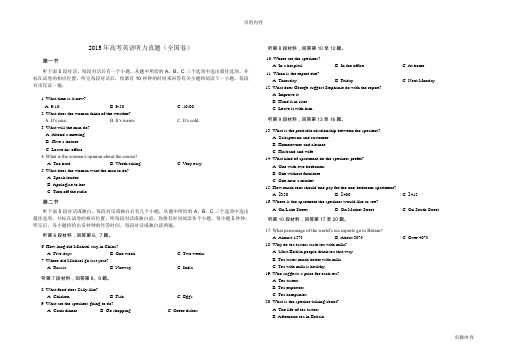
页眉内容2015年高考英语听力真题(全国卷)第一节听下面5段对话。
每段对话后有一个小题,从题中所给的A、B、C三个选项中选出最佳选项,并标在试卷的相应位置。
听完每段对话后,你都有10秒钟的时间来回答有关小题和阅读下一小题。
每段对话仅读一遍。
1. What time is it now?A. 9:10.B. 9:50.C. 10:00.2. What does the woman think of the weather?A. It’s nice.B. It’s warm.C. It’s cold.3. What will the man do?A. Attend a meeting.B. Give a lecture.C. Leave his office.4. What is the woman’s opinion about the course?A. Too hard.B. Worth taking.C. Very easy.5. What does the woman want the man to do?A. Speak louder.B. Apologize to her.C. Turn off the radio.第二节听下面5段对话或独白。
每段对话或独白后有几个小题,从题中所给的A、B、C三个选项中选出最佳选项,并标在试卷的相应位置。
听每段对话或独白前,你将有时间阅读各个小题,每小题5秒钟;听完后,各小题将给出5秒钟的作答时间。
每段对话或独白读两遍。
听第6段材料,回答第6、7题。
6. How long did Michael stay in China?A. Five days.B. One week.C. Two weeks.7. Where did Michael go last year?A. Russia.B. Norway.C. India.听第7段材料,回答第8、9题。
2015年高考英语全国卷·新课标I卷_(含答案与听力原文)
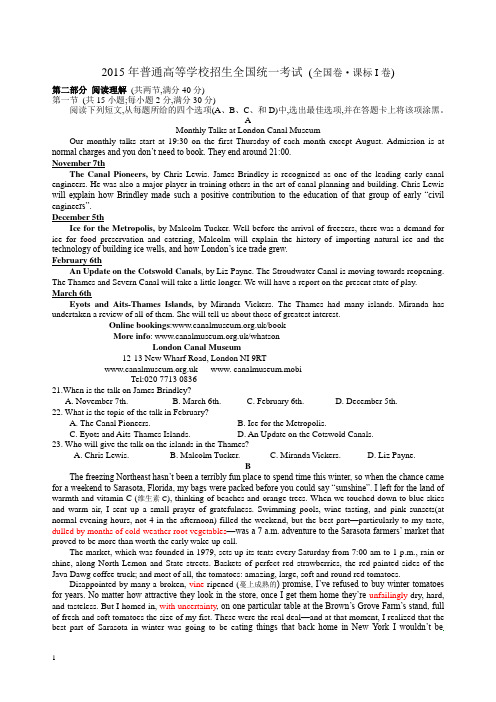
2015年普通高等学校招生全国统一考试(全国卷·课标I卷)第二部分阅读理解(共两节,满分40分)第一节(共15小题;每小题2分,满分30分)阅读下列短文,从每题所给的四个选项(A、B、C、和D)中,选出最佳选项,并在答题卡上将该项涂黑。
AMonthly Talks at London Canal MuseumOur monthly talks start at 19:30 on the first Thursday of each month except August. Admission is at normal charges and you don‟t need to book. They end around 21:00.November 7thThe Canal Pioneers, by Chris Lewis. James Brindley is recognized as one of the leading early canal engineers. He was also a major player in training others in the art of canal planning and building. Chris Lewis will explain how Brindley made such a positive contribution to the education of that group of early “civil enginee rs”.December 5thIce for the Metropolis, by Malcolm Tucker. Well before the arrival of freezers, there was a demand for ice for food preservation and catering, Malcolm will explain the history of importing natural ice and the technology of building ice wells, and how London‟s ice trade grew.February 6thAn Update on the Cotswold Canals, by Liz Payne. The Stroudwater Canal is moving towards reopening. The Thames and Severn Canal will take a little longer. We will have a report on the present state of play.March 6thEyots and Aits-Thames Islands,by Miranda Vickers. The Thames had many islands. Miranda has undertaken a review of all of them. She will tell us about those of greatest interest.Online bookings:/bookMore info: /whatsonLondon Canal Museum12-13 New Wharf Road, London NI 9RT www. canalmuseum.mobiTel:020 7713 083621.When is the talk on James Brindley?A. November 7th.B. March 6th.C. February 6th.D. December 5th.22. What is the topic of the talk in February?A. The Canal Pioneers.B. Ice for the Metropolis.C. Eyots and Aits-Thames Islands.D. An Update on the Cotswold Canals.23. Who will give the talk on the islands in the Thames?A. Chris Lewis.B. Malcolm Tucker.C. Miranda Vickers.D. Liz Payne.BThe freezing Northeast hasn‟t been a terribly fun place to spend time this winter, so when the chance came for a weekend to Sarasota, Florida, my bags were packed before you could say “sunshine”. I left for the land of warmth and vitamin C (维生素C), thinking of beaches and orange trees. When we touched down to blue skies and warm air, I sent up a small prayer of gratefulness. Swimming pools, wine tasting, and pink sunsets(at normal evening hours, not 4 in the afternoon) filled the weekend, but the best part—particularly to my taste, dulled by months of cold-weather root vegetables—was a 7 a.m. adventure to the Sarasota farmers‟ market that proved to be more than worth the early wake-up call.The market, which was founded in 1979, sets up its tents every Saturday from 7:00 am to 1 p.m., rain or shine, along North Lemon and State streets. Baskets of perfect red strawberries, the red-painted sides of the Java Dawg coffee truck; and most of all, the tomatoes: amazing, large, soft and round red tomatoes.Disappointed by many a broken, vine-ripened (蔓上成熟的) promise, I‟ve refused to buy winter tomatoes for years. No matter how attractive they look in the store, once I get them home they‟re unfailingly dry, hard, and tasteless. But I homed in, with uncertainty, on one particular table at the Brown‟s Grove Farm‟s stand, full of fresh and soft tomatoes the size of my fist. These were the real deal—and at that moment, I realized that the best part of Sarasota in winter was going to be ea ting things that back home in New York I wouldn‟t beexperiencing again for months.Delighted as I was by the tomatoes in sight, my happiness deepened when I learned that Brown‟s Grove Farm is one of the suppliers for Jack Dusty, a newly opened restaurant at the Sarasota Ritz Carlton, where―luckily for me—I was planning to have dinner that very night. Without even seeing the menu, I knew I‟d be ordering every tomato on it.24. What did the author think of her winter life in New York?A. Exciting.B. Boring.C. Relaxing.D. Annoying.25. What made the author‟s getting up early worthwhile?A. Having a swim.B. Breathing in fresh air.C. Walking in the morning sun.D. Visiting a local farmer‟s market.26. What can we learn about tomatoes sold in New York in winter?A. They are soft.B. They look nice.C. They taste great.D. They are juicy.27. What was the author going to that evening?A. Eat in a restaurant.B. Check into a hotel.C. Go to a farm.D. Buy fresh vegetables.CSalvador Dali (1904―1989) was one of the most popular of modern artists. The Pompidou Centre in Paris is showing its respect and admiration for the artist and his powerful personality with an exhibition bringing together over 200 paintings, sculptures, drawings and more. Among the works and masterworks on exhibition the visitor will find the best pieces, most importantly The Persistence of Memory. There is also L’Enigme sans Fin from 1938, works on paper, objects, and projects for stage and screen and selected parts from television programmes reflecting the artist‟s showman qualities.The visitor will enter the World of Dali through an egg and is met with the beginning, the world of birth. The exhibition follows a path of time and subject with the visitor exiting through the brain.The exhibition shows how Dali draws the viewer between two infinities (无限). “From the infinity small to the infinity large, contraction and expansion coming in and out of focus: amazing Flemish accuracy and the showy Baroque of old painting that he used in his museum-theatre in Figueras,” explains the Pompidou Centre.The fine selection of the major works was done in close collaboration (合作) with the Museo Nacional Reina Sofia in Madrid, Spain, and with contributions from other institutions like the Salvador Dali Museum in St. Petersburg, Florida.28. Which of the following best describes Dali according to Paragraph 1?A. Optimistic.B. ProductiveC. Generous.D. Traditional.29. What is Dali‟s The Persistence of Memory considered to be?A. One of his masterworks.B. A successful screen adaptation.C. An artistic creation for the stage.D. One of the best TV programmes.30. How are the exhibits arranged at the World of Dali?A. By popularity.B. By importance.C. By size and shape.D. By time and subject.31. What does the word “contributions” in the last paragraph refer to?A. Donations.B. Projects.C. Artworks.D. Documents.DConflict is on the menu tonight at the cafe La Chope. This evening, as on every Thursday night, psychologist Maud Lehanne is leading two of France‟s favorite pastimes, coffee drinking and the “talking cure”. Here they are learning to get in touch with thei r true feelings. It isn‟t always easy. The customers—some thirty Parisians who pay just under $ 2 (plus drinks) per session—are quick to intellectualize (高谈阔论), slow to open up and connect. “You are forbidden to say …one feels‟, or …people think‟,” Lehanne told them. “Say …I think‟, …Think me‟.”A cafe society where no intellectualizing is allowed? It couldn‟t seem more un-French. But Lehanne‟s psychology cafe is about more than knowing oneself: It‟s trying to help the city‟s troubled neighborhood cafes. Over the years, Parisian cafes have fallen victims to changes in the French lifestyle—longer working hours, a fast-food boom and a younger generation‟s desire to spend more time at home. Dozens of new theme cafes appear to change the situation. Cafes focused around psychology, history, and engineering are catching on, filling tables well into the evening.The city‟s “psychology cafes”, which offer great comfort, are among the most popular places.Middle-aged homemakers, retirees, and the unemployed come to such cafes to talk about love, anger, and dreams with a psychologist. And they come to Lehanne‟s group just to learn to say what they feel. “There is a strong need in Paris for communication,”says Maurice Frisch, a cafe La Chope regular who works as a religious instructor in a nearby church. “People have few real friends. And they need to open up.” Lehanne says she‟d like to see psychology cafes all over France. “If people had normal lives, these cafes wouldn‟t exist,” she says. “If life weren‟t a battle, people wouldn‟t need a special place just to speak.”But then, it wouldn‟t be France.32.What are people encouraged to do at the cafe La Chope?A. Learn a new subject.B. Keep in touch with friends.C. Show off their knowledge.D. Express their true feelings.33. How are cafes affected by French lifestyle changes?A. They have bigger night crowds.B. They stay open for longer hours.C. They are less frequently visited.D. They start to serve fast food.34. What are theme cafes expected to do?A. Save the cafe business.B. Supply better drinks.C. Create more jobs.D. Serve the neighborhood.35. Why are psychology cafes becoming popular in Paris?A. They bring people true friendship.B. They give people spiritual support.C. They help people realize their dreams.D. They offer a platform for business links.第二节(共5小题,每小题2分,满分10分)根据短文内容,从短文后的选项中选出能填入空白处的最佳选项,选项中有两项为多余选项。
2015年高考全国卷II(新课标)英语听力试题
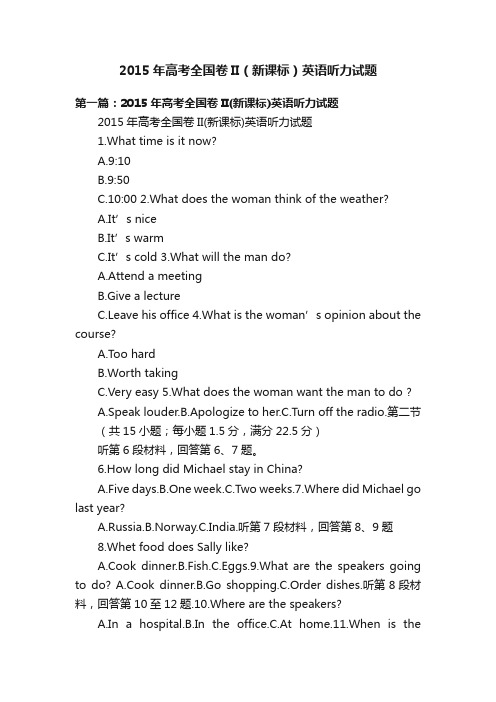
2015年高考全国卷II(新课标)英语听力试题第一篇:2015年高考全国卷II(新课标)英语听力试题2015年高考全国卷II(新课标)英语听力试题1.What time is it now?A.9:10B.9:50C.10:00 2.What does the woman think of the weather?A.It’s niceB.It’s warmC.It’s cold 3.What will the man do?A.Attend a meetingB.Give a lectureC.Leave his office 4.What is the woman’s opinion about the course?A.Too hardB.Worth takingC.Very easy 5.What does the woman want the man to do ?A.Speak louder.B.Apologize to her.C.Turn off the radio.第二节(共15小题;每小题1.5分,满分22.5分)听第6段材料,回答第6、7题。
6.How long did Michael stay in China?A.Five days.B.One week.C.Two weeks.7.Where did Michael go last year?A.Russia.B.Norway.C.India.听第7段材料,回答第8、9题8.Whet food does Sally like?A.Cook dinner.B.Fish.C.Eggs.9.What are the speakers going to do? A.Cook dinner.B.Go shopping.C.Order dishes.听第8段材料,回答第10至12题.10.Where are the speakers?A.In a hospital.B.In the office.C.At home.11.When is thereport due ?A.Thursday.B.Friday.C.Next Monday.12.What does George suggest Stephanie do with the report?A.Improve it.B.Hand it in later.C.Leave it with him.听第9段材料,回答第13至16题。
2015年高考真题——英语(新课标2卷) Word版+含解析
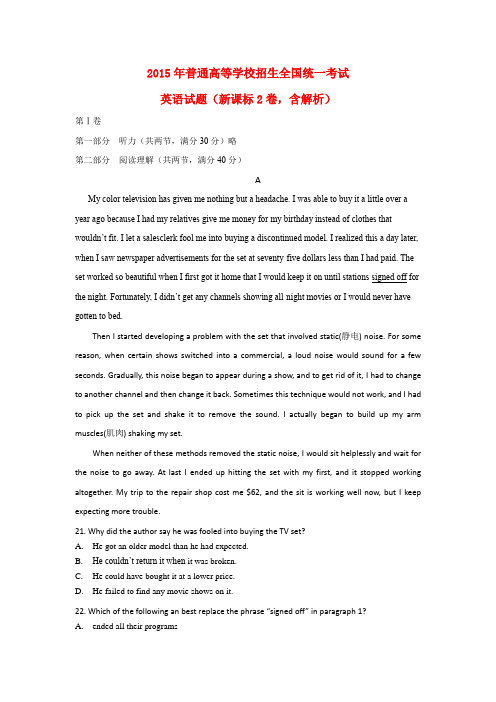
2015年普通高等学校招生全国统一考试英语试题(新课标2卷,含解析)第Ⅰ卷第一部分听力(共两节,满分30分)略第二部分阅读理解(共两节,满分40分)AMy color television has given me nothing but a headache. I was able to buy it a little over a year ago because I had my relatives give me money for my birthday instead of clothes that wouldn’t fit. I let a salesclerk fool me into buying a discontinued model. I realized this a day later, when I saw newspaper advertisements for the set at seventy-five dollars less than I had paid. The set worked so beautiful when I first got it home that I would keep it on until stations signed off for the night. Fortunately, I didn’t get any channels showing all-night movies or I would never have gotten to bed.Then I started developing a problem with the set that involved static(静电) noise. For some reason, when certain shows switched into a commercial, a loud noise would sound for a few seconds. Gradually, this noise began to appear during a show, and to get rid of it, I had to change to another channel and then change it back. Sometimes this technique would not work, and I had to pick up the set and shake it to remove the sound. I actually began to build up my arm muscles(肌肉) shaking my set.When neither of these methods removed the static noise, I would sit helplessly and wait for the noise to go away. At last I ended up hitting the set with my first, and it stopped working altogether. My trip to the repair shop cost me $62, and the sit is working well now, but I keep expecting more trouble.21. Why did the author say he was fooled into buying the TV set?A.He got an older model than he had expected.B.He couldn’t return it when it was broken.C.He could have bought it at a lower price.D.He failed to find any movie shows on it.22. Which of the following an best replace the phrase “signed off” in paragraph 1?A.ended all their programsB.provided fewer channelsC.changed to commercialsD.showed all-night movies23. How did the author finally get this TV set working again?A.By shaking and hitting itB.By turning it on and offC.By switching channelsD.By having it repaired24. How does the author sound when telling the story?A.CuriousB.AnxiousC.CautiousD.Humorous【答案】21. C 22. A 23. D 24. D21. C 细节理解题。
2015年全国卷听力试题+录音稿+答案(1) (1)
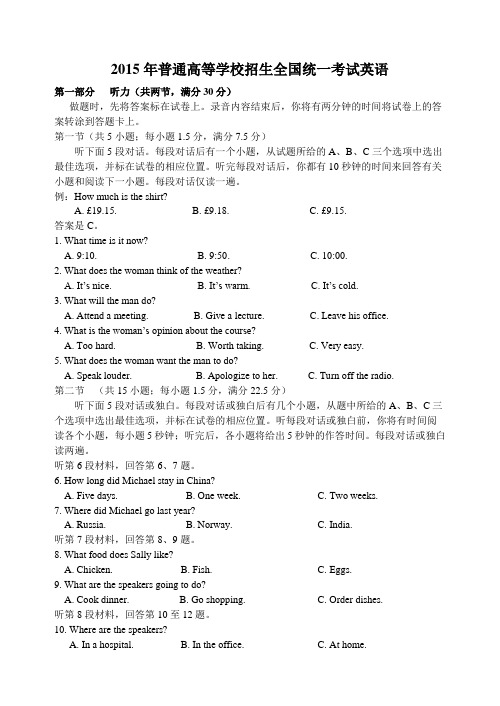
2015年普通高等学校招生全国统一考试英语第一部分听力(共两节,满分30分)做题时,先将答案标在试卷上。
录音内容结束后,你将有两分钟的时间将试卷上的答案转涂到答题卡上。
第一节(共5小题;每小题1.5分,满分7.5分)听下面5段对话。
每段对话后有一个小题,从试题所给的A、B、C三个选项中选出最佳选项,并标在试卷的相应位置。
听完每段对话后,你都有10秒钟的时间来回答有关小题和阅读下一小题。
每段对话仅读一遍。
例:How much is the shirt?A. £19.15.B. £9.18.C. £9.15.答案是C。
1. What time is it now?A. 9:10.B. 9:50.C. 10:00.2. What does the woman think of the weather?A. It’s nice.B. It’s warm.C. It’s cold.3. What will the man do?A. Attend a meeting.B. Give a lecture.C. Leave his office.4. What is the woman’s opinion about the course?A. Too hard.B. Worth taking.C. Very easy.5. What does the woman want the man to do?A. Speak louder.B. Apologize to her.C. Turn off the radio.第二节(共15小题;每小题1.5分,满分22.5分)听下面5段对话或独白。
每段对话或独白后有几个小题,从题中所给的A、B、C三个选项中选出最佳选项,并标在试卷的相应位置。
听每段对话或独白前,你将有时间阅读各个小题,每小题5秒钟;听完后,各小题将给出5秒钟的作答时间。
每段对话或独白读两遍。
2015年普通高等学校招生全国统一考试(课标全国卷I) 英语听力试题

2015年普通高等学校招生全国统一考试(课标全国卷I)第一部分听力(共两节,满分30分)第一节(共5小题;每小题1.5分,满分7.5分)听下面5段对话。
每段对话后有一个小题,从题中所给的A、B、C三个选项中选出最佳选项,并标在试卷的相应位置。
听完每段对话后,你都有10秒钟的时间来回答有关小题和阅读下一小题。
每段对话仅读一遍。
例:How much is the shirt?A. £ 19.15.B. £ 9.18.C. £ 9.15.答案是C。
1. What time is it now?A. 9:10.B. 9:50.C. 10:00.2. What does the woman think of the weather?A. It’s nice.B. It’s warm.C. It’s cold.3. What will the man do?A. Attend a meeting.B. Give a lecture.C. Leave his office.4. What is the woman’s opinion about the course?A. Too hard.B. Worth taking.C. Very easy.5. What does the woman want the man to do?A. Speak louder.B. Apologize to her.C. Turn off the radio.第二节(共15小题;每小题1.5分,满分22.5分)听下面5段对话或独白。
每段对话或独白后有几个小题,从题中所给的A、B、C三个选项中选出最佳选项,并标在试卷的相应位置。
听每段对话或独白前,你将有时间阅读各个小题,每小题5秒钟;听完后,各小题将给出5秒钟的作答时间。
每段对话或独白读两遍。
听第6段材料,回答第6、7题。
6. How long did Michael stay in China?A. Five days.B. One week.C. Two weeks.7. Where did Michael go last year?A. Russia.B. Norway.C. India.听第7段材料,回答第8、9题。
2015年全国统一高考英语试卷听力+原文+答案(新课标Ⅰ、Ⅱ)
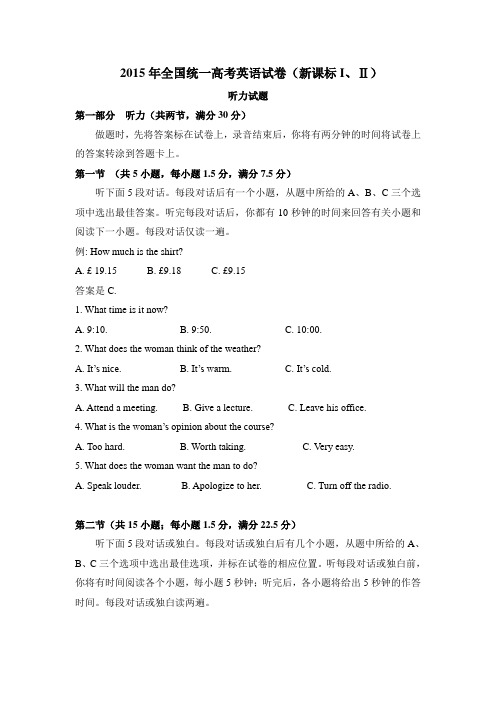
2015年全国统一高考英语试卷(新课标I、Ⅱ)听力试题第一部分听力(共两节,满分30分)做题时,先将答案标在试卷上,录音结束后,你将有两分钟的时间将试卷上的答案转涂到答题卡上。
第一节(共5小题,每小题1.5分,满分7.5分)听下面5段对话。
每段对话后有一个小题,从题中所给的A、B、C三个选项中选出最佳答案。
听完每段对话后,你都有10秒钟的时间来回答有关小题和阅读下一小题。
每段对话仅读一遍。
例: How much is the shirt?A. £ 19.15B. £9.18C. £9.15答案是C.1. What time is it now?A. 9:10.B. 9:50.C. 10:00.2. What does the woman think of the weather?A. It’s nice.B. It’s warm.C. It’s cold.3. What will the man do?A. Attend a meeting.B. Give a lecture.C. Leave his office.4. What is the woman’s opinion about the course?A. Too hard.B. Worth taking.C. Very easy.5. What does the woman want the man to do?A. Speak louder.B. Apologize to her.C. Turn off the radio.第二节(共15小题;每小题1.5分,满分22.5分)听下面5段对话或独白。
每段对话或独白后有几个小题,从题中所给的A、B、C三个选项中选出最佳选项,并标在试卷的相应位置。
听每段对话或独白前,你将有时间阅读各个小题,每小题5秒钟;听完后,各小题将给出5秒钟的作答时间。
每段对话或独白读两遍。
word 版最新2015年全国新课标卷I 精校版(含答案及听力原文)(山东、河北、江西、河南)

2015年普通高等学校招生全国统一考试英语本试卷分第I卷(选择题)和第II卷(非选这题)两部分,考试结束后,将本试卷和答题卡一并交回。
第I卷注意事项:1.答第I卷前,考生务必将自己的姓名、考试号填写在答题卡上。
2.选出每小题答案后,用铅笔把答题卡上对应题目的答案标号涂黑。
如需改动,用橡皮擦干净后,再选涂其他答案标号。
不能答在本试卷上,否则无效。
第一部分听力(共两节,满分30分)做题时,先将答案标在试卷上。
录音内容结束后;你将有两分钟的时间将试卷上的答案转涂到答题卡上.第一节(共5小题;每小题1.5分,满分7.5分)听下面5段对话。
每段对话后有一个小题,从每题所给的A、B、C三个选项中选出最佳选项,并标在试卷的相应位置。
听完每段对话后,你都有10秒钟的时间来回答有关小题和阅读下一小题。
每段对话仅读一遍。
1.What time is it now?A. 9:10.B. 9:50.C. 10:00.2. What does the woman think of the weather?A. It’s nice.B. It’s warm.C. It’s cold.3. What will the man do?A. Attend a meeting.B. Give a lecture.C. Leave his office.4. What is the woman’s opinion about the course?A. Too hard.B. Worth taking.C. Very easy.5. What does the woman want the man to do?A. Speak louder.B. Apologize to her.C. Turn off the radio.第二节(共15小题;每小题1.5分,满分22.5分)听下面5段对话或独白。
每段对话或独白后有几个小题,从题中所给的A、B、C三个选项中选出最佳选项,并标在试卷的相应位置。
2015年全国高考英语试卷听力+原文+答案(新课标Ⅰ、Ⅱ)

2015年全国统一高考英语试卷(新课标I、Ⅱ)听力试题第一部分听力(共两节,满分30分)做题时,先将答案标在试卷上,录音结束后,你将有两分钟的时间将试卷上的答案转涂到答题卡上。
第一节(共5小题,每小题1.5分,满分7.5分)听下面5段对话。
每段对话后有一个小题,从题中所给的A、B、C三个选项中选出最佳答案。
听完每段对话后,你都有10秒钟的时间来回答有关小题和阅读下一小题。
每段对话仅读一遍。
例:How much is the shirt?A.£19.15B.£9.18C.£9.15答案是C.1.What time is it now?A.9:10.B.9:50.C.10:00.2.What does the woman think of the weather?A.It’s nice.B.It’s warm.C.It’s cold.3.What will the man do?A.Attend a meeting.B.Give a lecture.C.Leave his office.4.What is the woman’s opinion about the course?A.Too hard.B.Worth taking.C.Very easy.5.What does the woman want the man to do?A.Speak louder.B.Apologize to her.C.Turn off the radio.第二节(共15小题;每小题1.5分,满分22.5分)听下面5段对话或独白。
每段对话或独白后有几个小题,从题中所给的A、B、C三个选项中选出最佳选项,并标在试卷的相应位置。
听每段对话或独白前,你将有时间阅读各个小题,每小题5秒钟;听完后,各小题将给出5秒钟的作答时间。
每段对话或独白读两遍。
听第6段材料,回答第6、7题。
6.How long did Michael stay in China?A.Five days.B.One week.C.Two weeks.7.Where did Michael go last year?A.Russia.B.Norway.C.India.听第7段材料,回答第8、9题。
2015年高考真题英语听力真题及听力原文附答案(全国卷)
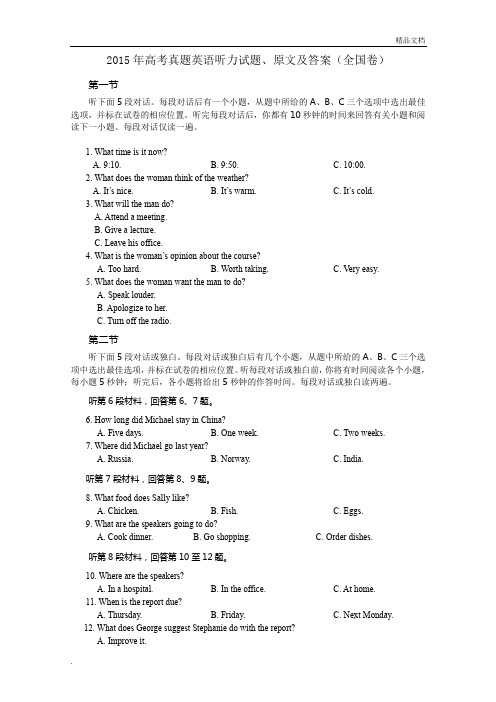
精品文档2015年高考真题英语听力试题、原文及答案(全国卷)第一节听下面5段对话。
每段对话后有一个小题,从题中所给的A、B、C三个选项中选出最佳选项,并标在试卷的相应位置。
听完每段对话后,你都有10秒钟的时间来回答有关小题和阅读下一小题。
每段对话仅读一遍。
1. What time is it now?A. 9:10.B. 9:50.C. 10:00.2. What does the woman think of the weather?A. It’s nice.B. It’s warm.C. It’s cold.3. What will the man do?A. Attend a meeting.B. Give a lecture.C. Leave his office.4. What is the woman’s opinion about the course?A. Too hard.B. Worth taking.C. Very easy.5. What does the woman want the man to do?A. Speak louder.B. Apologize to her.C. Turn off the radio.第二节听下面5段对话或独白。
每段对话或独白后有几个小题,从题中所给的A、B、C三个选项中选出最佳选项,并标在试卷的相应位置。
听每段对话或独白前,你将有时间阅读各个小题,每小题5秒钟;听完后,各小题将给出5秒钟的作答时间。
每段对话或独白读两遍。
听第6段材料,回答第6、7题。
6. How long did Michael stay in China?A. Five days.B. One week.C. Two weeks.7. Where did Michael go last year?A. Russia.B. Norway.C. India.听第7段材料,回答第8、9题。
- 1、下载文档前请自行甄别文档内容的完整性,平台不提供额外的编辑、内容补充、找答案等附加服务。
- 2、"仅部分预览"的文档,不可在线预览部分如存在完整性等问题,可反馈申请退款(可完整预览的文档不适用该条件!)。
- 3、如文档侵犯您的权益,请联系客服反馈,我们会尽快为您处理(人工客服工作时间:9:00-18:30)。
2015年高考英语听力真题(全国卷)第一节听下面5段对话。
每段对话后有一个小题,从题中所给的A、B、C三个选项中选出最佳选项,并标在试卷的相应位置。
听完每段对话后,你都有10秒钟的时间来回答有关小题和阅读下一小题。
每段对话仅读一遍。
1. What time is it now?A. 9:10.B. 9:50.C. 10:00.2. What does the woman think of the weather?A. It’s nice.B. It’s warm.C. It’s cold.3. What will the man do?A. Attend a meeting.B. Give a lecture.C. Leave his office.4. What is the woman’s opinion about the course?A. Too hard.B. Worth taking.C. Very easy.5. What does the woman want the man to do?A. Speak louder.B. Apologize to her.C. Turn off the radio.第二节听下面5段对话或独白。
每段对话或独白后有几个小题,从题中所给的A、B、C三个选项中选出最佳选项,并标在试卷的相应位置。
听每段对话或独白前,你将有时间阅读各个小题,每小题5秒钟;听完后,各小题将给出5秒钟的作答时间。
每段对话或独白读两遍。
听第6段材料,回答第6、7题。
6. How long did Michael stay in China?A. Five days.B. One week.C. Two weeks.7. Where did Michael go last year?A. Russia.B. Norway.C. India.听第7段材料,回答第8、9题。
8. What food does Sally like?A. Chicken.B. Fish.C. Eggs.9. What are the speakers going to do?A. Cook dinner.B. Go shopping.C. Order dishes.听第8段材料,回答第10至12题。
10. Where are the speakers?A. In a hospital.B. In the office.C. At home.11. When is the report due?A. Thursday.B. Friday.C.Next Monday.12. What does George suggest Stephanie do with the report?A. Improve it.B. Hand it in later.C. Leave it with him.听第9段材料,回答第13至16题。
13. What is the probable relationship between the speakers?A. Salesperson and customer.B. Homeowner and cleaner.C. Husband and wife.14. What kind of apartment do the speakers prefer?A. One with two bedrooms.B. One without furniture.C. One near a market.15. How much rent should one pay for the one-bedroom apartment?A. $350.B. $400.C. $415.16. Where is the apartment the speakers would like to see?A. On Lake Street.B. On Market Street.C. On South Street.听第10段材料,回答第17至20题。
17. What percentage of the world’s tea exports go to Britain?A. Almost 15%.B. About 30%.C. Over 40%. 18. Why do tea tasters taste tea with milk?A. Most British people drink tea that way.B. Tea tastes much better with milk.C. Tea with milk is healthy.19. Who suggests a price for each tea?A. Tea tasters.B. Tea exporters.C. Tea companies.20. What is the speaker talking about?A. The life of tea tasters.B. Afternoon tea in Britain.C. The London Tea Trade Centre.录音原文Example:M: Excuse me, can you tell me how much the shirt is?W: Yes, it’s nine-fifteen.Text 1W: What time is your train leaving?M: It leaves at ten. I’ve got fiftyminutes left.W: You’d better hurry, or you won’t be able to catch it.Text 2M: Nice weather we’re having, don’t you think?W: No. It is too cold.M: I think it is just right.W: I’d prefer it a few degrees warmer.Text 3M: Now, let’sstop talking and get going. I need to be in my office in fifteen minutes, or I’ll be late for a meeting.W: Okay, bye.Text 4M: This course is really difficult.W: I don’t think it’s all that bad. And we’ll benefit a lot from it.M: So, you’re taking it too?W: That’s true.Text 5W: Could you turn that off? I can’t hear myself think.M: What?W: The radio.M: Oh! Sorry.Text 6W: Hi Michael! I heard you just came back from a holiday.M: Yes. I stayed for a week in China, and five days in India.W: You do travel a lot, don’t you? Last year, you went to Norway, right? M: Well, I’ve been to quite some countries, but not yet to Norway. Last summer,I toured Russia for two weeks.Text 7M: Sally, do you like seafood?W: Yes, of course.M: Is there anything you especially like?W: Well, I really don’t know. I can never remember the names.M: Okay. Is there any food you don’t eat?W: Well, I don’t eat chicken. And I don’t like eggs, either. But Ilike all kinds of fish and vegetables.M: Then let’s look at the menu and see what they’ve got for us. Text 8M: You look pale, Steph anie. What’s wrong?W: I don ’t feel good. I have a bad headache. In fact, I haven ’t got much sleepthis past week, and I feel really tired. M: Why don ’t you go to see a doctor?W: Yeah, I think I should. But I have a report due tomorrow. Ms. Jenkins needs it for the board meeting next Monday. M: Well, it ’s Wednesday today. Why don ’t you talk to Ms. Jenkins, and ask if you can hand it in on Friday morning? W: Maybe I should try. I guess I just need a good sleep. Thanks, George. M: If you need any help with the report, just let me know. Text 9W: Anything interesting in the paper today, dear?M: Well, yeah. There are a few here that might interest us. Here ’s one for just four hundred dollars. It only has one bedroom, but it sounds nice, near Lake Street.W: Yeah. Let me see what the cheapest two-bedroom apartment is. Oh, here’s one on Market Street. It ’s a real bargain. Only three hundred and fiftydollars. But it doesn’t have any furniture. M: Well, it costs a lot to buy all the furniture. W: Oh, here’s another one for just over four hundred dollars. This sounds very interesting! It ’s on South Street. That ’s a nice area. M: Yes, it ’s quiet. Did you say two bedrooms?W: Yes, at four hundred and fifteen dollars.M: Why don ’t we go and have a look?W: Okay, I ’ll give them a call.Text 10 Look at this picture. It ’s the London Tea Trade Cent re. As you can see, it ison the north bank of the river Thames. It is the center of an important industryin the everyday lives of the British people. Tea is the British national drink.Every man, woman, and child over ten years of age has on average over fourcups a day. Or some one thousand, five hundred cups annually. About thirtypercent of the world ’s exports of tea makes its way to London. And Britain is byfar the largest importer of tea in the world. Now, in the second picture, you cansee how tea is tasted in the TeaTradeCenter before it is sold. Here, differenttypes of tea are tasted by skilled tea tasters, before they’re sold at each w tea sale. It ’s amazing to see them at work. Over a hundred kinds of tea are laid out in a line on long tables. The tasters generally taste teas with milk, since that is how the majority of British people drink their tea. The tasters move down the line with surprising speed, tasting from a spoon and deciding what is a fair price for each tea. After that, they …参考答案1-5: ACABC 6-10: BABCB 11-15: ABCAB 16-20: CBAAC。
